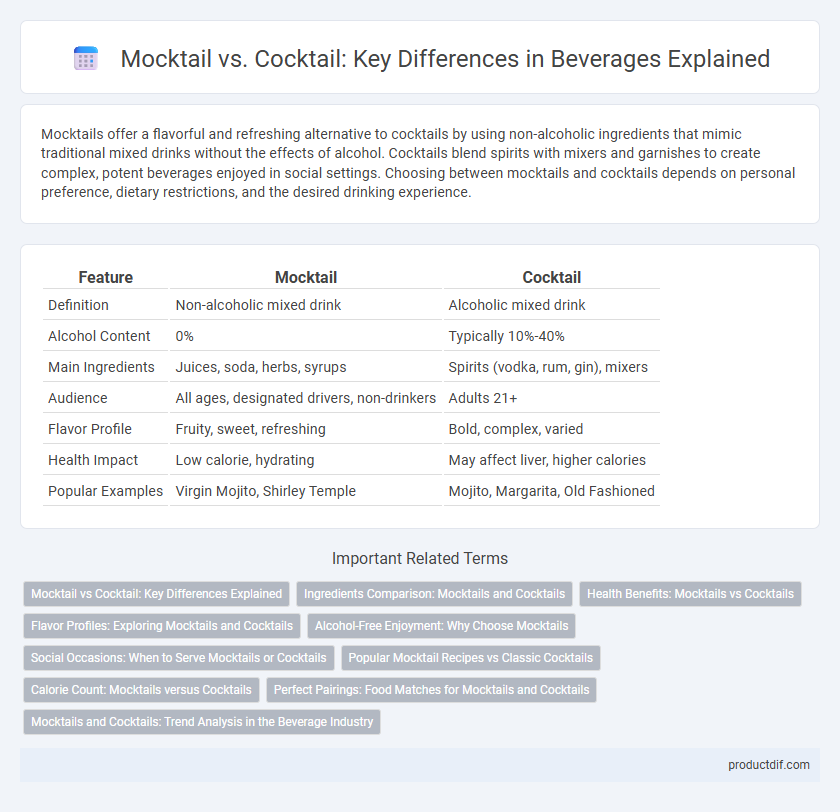Mocktails offer a flavorful and refreshing alternative to cocktails by using non-alcoholic ingredients that mimic traditional mixed drinks without the effects of alcohol. Cocktails blend spirits with mixers and garnishes to create complex, potent beverages enjoyed in social settings. Choosing between mocktails and cocktails depends on personal preference, dietary restrictions, and the desired drinking experience.
Table of Comparison
| Feature | Mocktail | Cocktail |
|---|---|---|
| Definition | Non-alcoholic mixed drink | Alcoholic mixed drink |
| Alcohol Content | 0% | Typically 10%-40% |
| Main Ingredients | Juices, soda, herbs, syrups | Spirits (vodka, rum, gin), mixers |
| Audience | All ages, designated drivers, non-drinkers | Adults 21+ |
| Flavor Profile | Fruity, sweet, refreshing | Bold, complex, varied |
| Health Impact | Low calorie, hydrating | May affect liver, higher calories |
| Popular Examples | Virgin Mojito, Shirley Temple | Mojito, Margarita, Old Fashioned |
Mocktail vs Cocktail: Key Differences Explained
Mocktails are non-alcoholic beverages crafted to mimic the flavors and presentation of cocktails, making them suitable for all ages and occasions without the effects of alcohol. Cocktails combine various spirits, mixers, and garnishes to create complex flavor profiles and typically contain varying levels of alcohol by volume (ABV). The primary difference lies in the presence of alcohol, influencing taste, calorie content, and consumption context, with mocktails offering a safer, inclusive alternative to traditional cocktails.
Ingredients Comparison: Mocktails and Cocktails
Mocktails typically incorporate a mix of fruit juices, sodas, herbs, and syrups, emphasizing natural and non-alcoholic ingredients to create complex flavors. Cocktails combine spirits such as vodka, rum, gin, or whiskey with mixers like bitters, vermouth, or liqueurs, often balancing alcohol content with complementary ingredients. Both beverages rely on fresh herbs, citrus, and sweeteners, but cocktails uniquely feature alcoholic bases that define their character and potency.
Health Benefits: Mocktails vs Cocktails
Mocktails offer a healthier alternative to cocktails by eliminating alcohol, which reduces calorie intake and lowers the risk of liver damage and addiction. They are often made with fresh fruit juices, herbs, and natural sweeteners, providing essential vitamins and antioxidants that support hydration and overall wellness. Cocktails, while enjoyable in moderation, can contribute to dehydration, increased sugar consumption, and impaired metabolic health due to their alcohol and sugary mixer content.
Flavor Profiles: Exploring Mocktails and Cocktails
Mocktails feature vibrant, refreshing flavors relying on fresh fruit juices, herbs, and spices that create complex, layered tastes without alcohol. Cocktails combine spirits like vodka, rum, or gin with mixers to balance sweetness, bitterness, and acidity, producing stronger and more intense flavor profiles. Both offer diverse sensory experiences, with mocktails emphasizing natural and crisp flavors while cocktails highlight boldness and depth through alcohol-infused blends.
Alcohol-Free Enjoyment: Why Choose Mocktails
Mocktails offer a vibrant, alcohol-free alternative that satisfies complex flavor cravings without the intoxicating effects of cocktails. Crafted with fresh ingredients, herbs, and natural syrups, mocktails provide a sophisticated taste experience suitable for all ages and occasions. Choosing mocktails promotes inclusivity, wellness, and mindful drinking while still allowing guests to enjoy the social and sensory pleasures traditionally associated with alcoholic beverages.
Social Occasions: When to Serve Mocktails or Cocktails
Mocktails are ideal for family gatherings, baby showers, and work events where a non-alcoholic option ensures inclusivity and safety. Cocktails are typically preferred at adult parties, formal dinners, and celebrations that emphasize sophisticated flavors and alcohol pairings. Offering both mocktails and cocktails caters to diverse guest preferences, enhancing the social experience at weddings and holiday events.
Popular Mocktail Recipes vs Classic Cocktails
Popular mocktail recipes like Virgin Mojito, Shirley Temple, and Nojito offer refreshing, alcohol-free alternatives to classic cocktails such as the Mojito, Margarita, and Martini, maintaining complex flavors through fresh ingredients like lime, mint, and soda. Mocktails prioritize natural fruit juices, herbs, and sweeteners to create vibrant, guilt-free beverages, making them ideal for health-conscious consumers and social events. Classic cocktails rely on spirits like rum, tequila, or gin blended with mixers and garnishes, offering timeless, sophisticated tastes that continue to dominate bar menus worldwide.
Calorie Count: Mocktails versus Cocktails
Mocktails typically contain fewer calories than cocktails because they exclude alcoholic ingredients, which are calorie-dense. A standard cocktail can range from 150 to over 500 calories depending on alcohol type and mixers, whereas mocktails often average between 50 to 150 calories due to fruit juices and soda bases. Consumers seeking lower calorie beverage options tend to prefer mocktails for their reduced impact on daily caloric intake.
Perfect Pairings: Food Matches for Mocktails and Cocktails
Mocktails pair exceptionally well with light appetizers such as fresh fruit platters, vegetable crudites, and mild cheeses, enhancing their refreshing and nuanced flavors without overpowering the palate. Cocktails complement richer dishes like grilled meats, spicy cuisines, and creamy cheeses, where the alcohol content and bold ingredients accentuate complex taste profiles. Selecting the right food pairing intensifies the overall sensory experience by balancing sweetness, acidity, and bitterness in both beverages and dishes.
Mocktails and Cocktails: Trend Analysis in the Beverage Industry
Mocktails and cocktails have surged in popularity as beverage trends reflect shifting consumer preferences toward diverse flavor experiences and healthier lifestyle choices. Market data from 2023 shows a 15% growth in non-alcoholic mocktail sales, driven by increasing demand for alcohol-free options and inclusive social drinking. Cocktail innovation continues with craft mixology techniques and premium ingredients, fueling a parallel rise in cocktail consumption in upscale bars and restaurants.
Mocktail vs Cocktail Infographic

 productdif.com
productdif.com